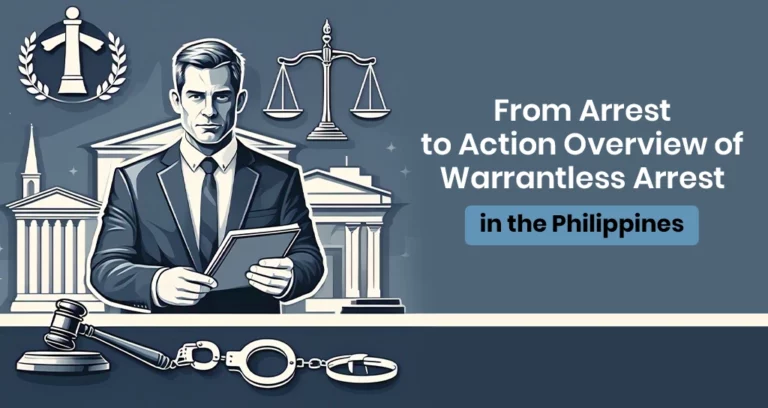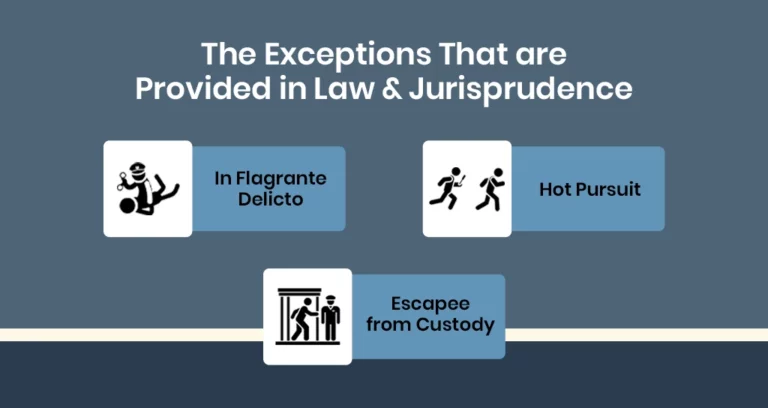
When can someone be arrested by the police without a warrant? Although a court warrant is often required for an arrest in the Philippines, there are legal exceptions for warrantless arrests. To protect individual rights and ascertain if an arrest is lawful, it is crucial to be aware of these exceptions. Basically, when the police make an arrest without a court order, it is known as a warrantless arrest. The general rule is that all warrantless arrests are unjustified, except when it falls under the lawful warrantless arrests under Rule 113, Section 5 and the exceptions provided in law and jurisprudence. The exceptions are clarified in detail below:
Under this concept, an arrest is valid if the individual is apprehended in the act of committing, trying to commit, or has committed a crime within the arresting officer’s presence.
A number of Supreme Court decisions shed light on this concept. In People v. Montilla (1998), the Court decided that police officers who apprehended the accused red-handed with marijuana during a random checkpoint operation performed a valid in flagrante delicto arrest. However, in People v. Aminnudin (1988), the Court ruled that even with previous surveillance, police arresting the accused without having seen the crime happen before their eyes rendered the warrantless arrest unlawful. In the same manner, in People v. Molina (2001), the Supreme Court reiterated that the arresting officers themselves should have direct knowledge of the criminal act during the arrest—not just mere suspicion or based on intelligence reports.
An important takeaway from these cases is that the offense should be open, ongoing, or just perpetrated in the officer’s presence—preliminary suspicion or anonymous tips are not enough.
If the crime has just been committed and the police officer has firsthand knowledge of facts demonstrating the suspect’s involvement, they are permitted to make an arrest without a warrant. This is supported by the law. The Supreme Court clarified in People v. Escordial (2002) that while eyewitness testimony may guide an arrest, the arresting officer must verify these facts; arrests based only on generic descriptions or intuition are not admissible. According to Pestilos v. Generoso (2014), the police must have reliable information based on firsthand knowledge, and the arrest must be made soon after the crime. Overall, the phrase “just been committed” signifies within a brief period, and the officer should not have to depend on hearsay.
A third valid warrantless arrest scenario is when an individual flees jail, prison, or during transportation. An arrest of a fugitive need not be backed by a warrant of arrest. If a person escapes from prison or detention, or while being transferred to another place of confinement, law enforcement is authorized to arrest them without a warrant.
Overall, even where warrantless arrests are permitted, constitutional rights have to be upheld. These include the right to remain silent, the right to be told why the arrest is being made, and the right to speak with counsel. If these rights are abused, the arrest— and any evidence derived from it—can be challenged in court. That said, a seasoned criminal defense attorney is instrumental in the determination of the legality of the arrest. They are also tasked with filing motions to suppress illegally obtained evidence and defending the rights of the accused during the legal process.

To protect oneself from being the victim of an unlawful warrantless arrest, it is crucial to be aware of your rights. Too often, warrantless arrests, which are lawfully allowed in certain situations—are abused and misunderstood. The Supreme Court has set precise guidelines through jurisprudence to deter abuse. Knowing these safeguards
guarantees that law enforcement stays within the bounds of the law and that individuals are aware of any potential violations of their rights.
Disclaimer: The content on this website is offered as general information only and is not intended to be legal advice or a solicitation for legal services. The information is not being supplied as part of an attorney-client relationship between the Lawyers of Ricasio Law and anyone viewing it. Viewers should not rely on the information on this website for making legal decisions, but should instead get legal assistance from a skilled attorney. You should not act exclusively on the basis of the material on this website and are strongly recommended to seek the legal advice of a lawyer.
If you are interested in the legal representation, counseling, and other legal services that we offer, please contact us using the information provided on this website. You can also discover more about our real estate transaction services here.
About Us
Ricasio Law is a boutique law firm specializing in business law and contracts, litigation, and labor and employment. Our team of experienced lawyers are committed to providing personalized and effective legal solutions to our clients. Our practice areas are broad and designed to meet your needs. Our team is dedicated to helping you achieve your goals